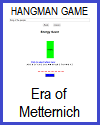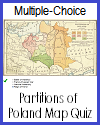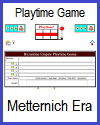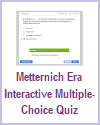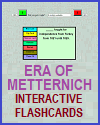Playing interactive learning games can be highly beneficial for high school World History students studying the Age of Reaction in nineteenth-century Europe.
These games make learning engaging and immersive, allowing students to actively participate in historical scenarios.
For example, role-playing games can simulate the Congress of Vienna, where students assume the roles of key diplomats like Metternich, negotiating treaties and alliances.
This hands-on approach helps students understand the complexities of diplomatic relations and the balance of power.
Trivia games can reinforce important facts and dates, enhancing recall and retention. Strategy games can illustrate the impact of various political decisions and revolutionary movements, helping students grasp cause-and-effect relationships.
Additionally, interactive games promote critical thinking, problem-solving, and collaboration, as students must work together to achieve objectives.
By making history interactive and enjoyable, these games foster a deeper, more lasting understanding of the Age of Reaction and its significance in shaping modern Europe.
|



